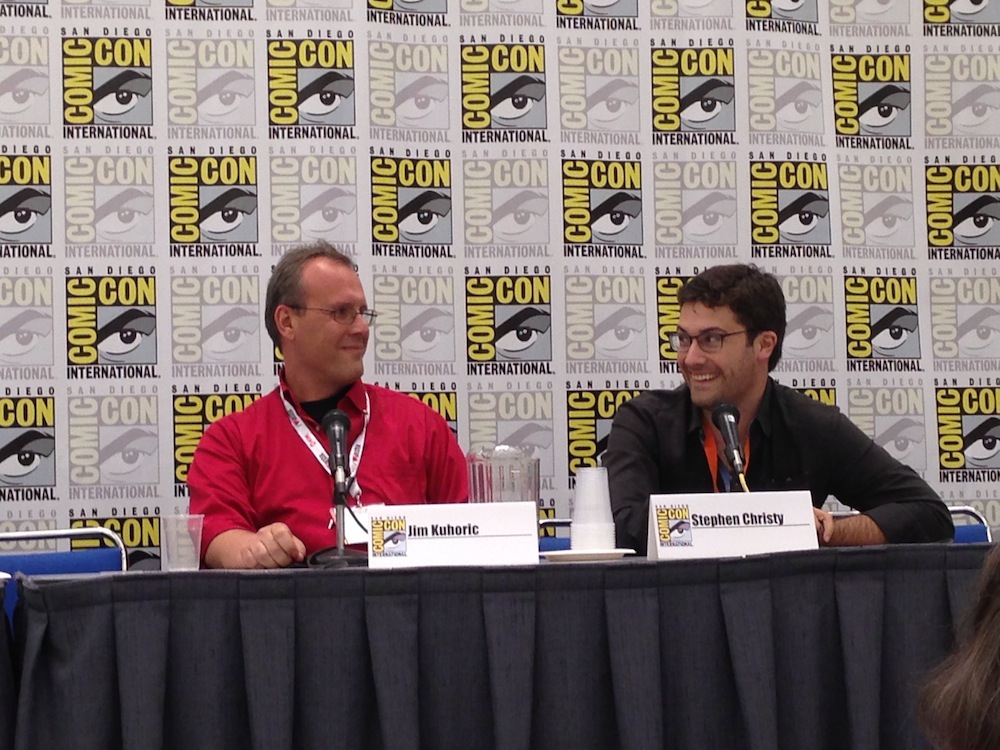by Carlos Aguilar
Somewhere in between the celebrity arrivals and the fan-pleasing revelations from the studios at Hall H of the San Diego Convention Center it was more than easy, even expected, to dismiss the prime medium the event was dedicated to, and to which all other forms of audiovisual entertainment had been added over the years. Comic books have sadly been demoted from their ruling place by the comic-book-inspired blockbusters and cult TV series that now paved the exhibit hall and dominated the roster of panels.
The diversification of content was simply an organic development to attract more attendees, an understandable transition for an event of its magnitude. But despite the crowded lineup at this year’s Comic Con, there was room for the old school medium of printed comic books. The specification must be made because there were also several talks on the rather new format that are digital comic books, a more profitable alternative to cut the middle man in which publishers become instant distributors selling their titles via online platforms.
Undoubtedly, whether it is digital or print, breaking into the business of comic books is sort of a mystified subject to which no certain answer or definitive paths can be passed on to upcoming writers and illustrators. As with most creative mediums the level of competition is ruthless and the opportunities offered scarce, yet, there are still some tried steps someone looking to make a living out of their passion can take. Honest and cautiously encouraging, the panelists at Comic Con’s Q&A named “Breaking Into Comics Right Now” shared their diverse backgrounds, and even more distinct stories of how they got their first chance at a career in this amazingly exclusive industry.
Moderating the event was Matt Gagnon, BOOM! Studios Editor-in-Chief, whose road to success is as eclectic as they come. He started making comics as a hobby with friends until he decided to move to Los Angeles to take his venture with a more serious approach. However, that choice did not pan out for him immediately. Gagnon worked in the retail side of the business—selling comics at Meltdown Comics on Sunset Blvd, where, although not doing the most glamorous or creative jobs, he made lots of contact that would later lead him to meet the CEO of Boom! Studios.
Leaving his financially secure job at a school district to take a chance on his passion, Scott Allie, now Dark Horse Editor-in-Chief, really risked his livelihood to pursue a job in comics. He admitted he was miserable at his previous workplace, so he drove to Sand Diego for Comic Con where he met Andy Watson, an artist he had always admired. They hit it off and shared many of the same interests, which proved to be his ticket into the industry. Thanks to newly-found friendship with Watson, Allie met his editor who ended up offering a position as an assistant editor. Of his lucky break he said, “Breaking into comics is like breaking out of prison; once a road has been taken it’s immediately closed off and I will not work for anyone else ever again”.
That indeed might as well be truth since the other two speakers had completely different anecdotes to tell about their genesis as members of the tight comic book community. Jim Kuhoric, Avatar Press Vice President of Publishing and Managing Editor, was a psychiatrist who had always wanted to be part of the comic book world as a creator. He worked behind the scenes learning the ins-and-outs of distribution and marketing, and slowly forged a relationships with a fellow creator to whom he pitched his ideas. Kuhoric has now realized his ambition as a writer and enjoys great success in the business. “There is not a lot of money, but it is something that fulfils you” he confessed. Lastly there is Stephen Christy, Archaia Editor-in-Chief, who couldn’t draw to save his life, and realized his writing wasn’t at the level of other more-talented creators. His approach was to take part in internships while he was in college, where ironically he was working to get a degree in documentary filmmaking. Christy was an intern at Devil’s Due Publishing, Marvel and DC where he gained the experience that would make him the prime candidate to manage Devil’s Due’s Los Angeles office.
The group focused on the importance of “who do you know,” rather than “what you know.” As Gagnon puts it “If you want to break into comics, build relationships.” Certainly not a secret, the crucial role of connections must not be underestimated. When asked where would be the best place to make those precious collaborative partnerships the group talked about “BarCon,” an unspoken named given to the bar scene that takes place in the San Diego downtown area during the four days of the convention. Important members of the comic book community can be seen hopping hotel lobbies and really having a good time, while at the same time setting the ground for possible work opportunities.
Of all the knowledge exposed by these decision makers, the most important one is the emphasis on the superhuman perseverance and passion an individual requires to survive the tribulations of a life in comics, which most certainly apply to anyone looking to get their foot in the door of any creative industry, whether in film, music, or fashion. In the words of Scott Allie, having a plan “B’ is not an option, “If you can imagine yourself doing anything else, do that, comics is not for quitters… If that fire is not within you, don’t waste time trying to manufacture it, because you can’t.”




